That picture book about tadpoles is back!!!
Picture books to nurture self-esteem『I am proud of myself』

Picture books to nurture self-esteem『I am proud of myself』

Learning World, the author of the Kids’ English Picture Book Series, has reissued this bilingual picture book 25 years after its original release.
Now, a free tadpole sticker will be offered to those who purchase “I am proud of myself”. Please be sure to order as soon as possible!
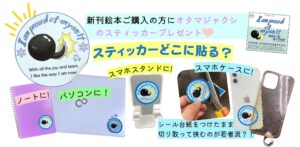
■Written and illustrated by Mikiko Nakamoto
A4 size 42 pages / All color / English only, English + Japanese with 2 audio QRs
Includes the song ‘Cause You’re My Friend’ at the end of the book
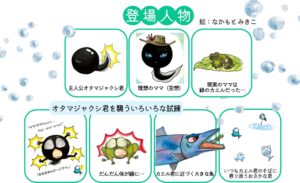
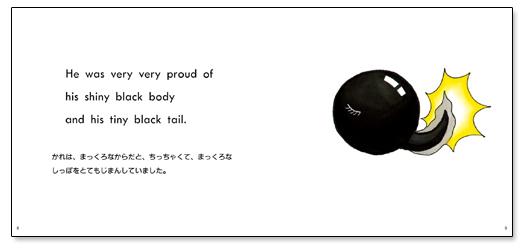
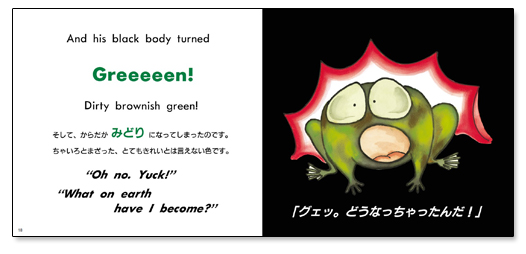
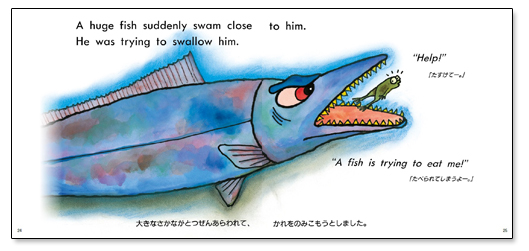
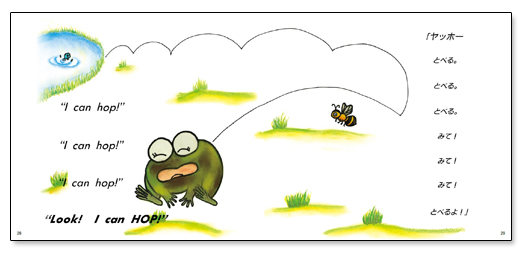
A little tadpole was proud of his dark body and tail.
One day, the little tadpole suddenly grows hands and feet, and his precious tail disappears, leaving him a not-so-pretty-colored frog… “I’m not pretty anymore… I’m not pretty anymore… I hate my friends, I hate everyone. I hate my friends, I hate everyone, and I hate myself! Through various experiences, the frog gradually regains his self-confidence. In the end, he comes to accept his “now” and says, “I may not be very good-looking, but… I’m pretty good-looking.

| This book was published to commemorate the 50th anniversary of Apricot Publishing, a publisher of children’s English teaching materials and English picture books, with the aim of English education for sharing and understanding each other. This book is a gift to all generations of people, including children who bear the future, young people and adults living in the present. |
 |
| I am proud of myself :Background to the publication of the reprint Learning World Series In the course of working with children for a long time as an English teacher, the author became concerned that many students would respond, “I have nothing good to say about myself,” when she asked them to write about their good points. In 1997, the author created an original picture book to convey this message of accepting yourself as you are to all students, from children to adults, and published it to commemorate the 15th anniversary of the English conversation school she manages. Published in a limited edition of 6,000 copies, the picture book became popular as a gift book for English schools, elementary schools, psychology university lectures, and as a gift for loved ones. In response to numerous requests for a reprint, the book was published by Apricot Publishing in June 2023. |

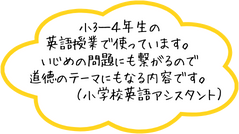
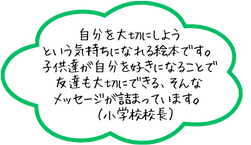
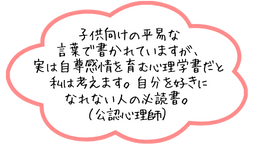

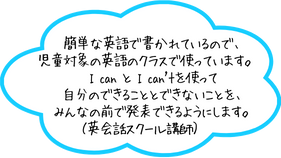
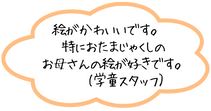
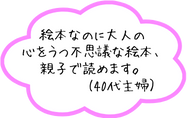
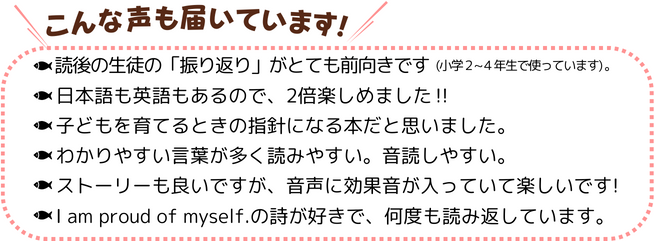

A little tadpole was proud of his dark body and tail.
One day, the little tadpole suddenly grows hands and feet, and his precious tail disappears, leaving him a not-so-pretty-colored frog… “I’m not pretty anymore… I’m not pretty anymore… I hate my friends, I hate everyone. I hate my friends, I hate everyone, and I hate myself! Through various experiences, the frog gradually regains his self-confidence. In the end, he comes to accept his “now” and says, “I may not be very good-looking, but… I’m pretty good-looking.
■Written and illustrated by Mikiko Nakamoto
A4 size, 40 pages, all color, with English and Japanese audio QR
Includes the song “Tomodachi dakara ‘Cause You’re My Friend




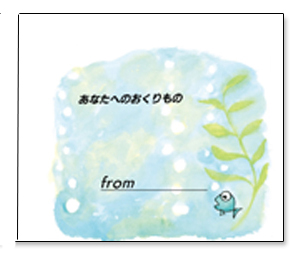 |
p.1:You can write the name of the person you wish to give the book to. |
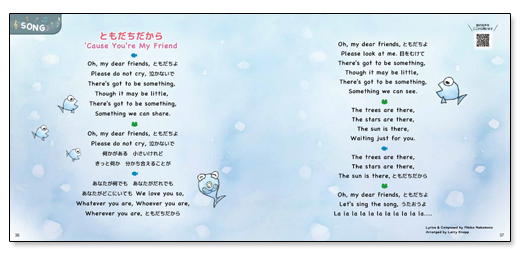 |
Song at the end of the book, “Tomodachi dakara” (Because we are friends): A reprinted version of the song has been added to the page with a song about the importance of companionship, friends, and family. |
| We present this picture book to all generations of people, including children who will lead the future, young people of today, and adults. |  |
| I am proud of myself Story leading to the publication of the reprinted edition In the course of working with children for a long time as an English teacher, the author became concerned that many students would respond, “I have nothing good to say about myself,” when asked to write about their good qualities. It was published in 1997 as a commemorative publication for the 15th anniversary of the English conversation school run by the author. It was published in 1997 as a commemorative publication for the 15th anniversary of the English conversation school run by the author himself. The book gained popularity as a gift book for English schools, elementary schools, university lectures on psychology, and as a gift for loved ones. In response to numerous requests for a reprint, the book was published by Apricot Press in June 2023. |








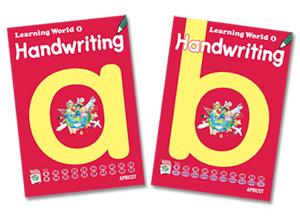
1 ”WELCOME to Learning World”(PINK, YELLOW, BLUE) will build vocabulary and basic expression.
2 At the beginning of “Book 1”, start tracing and writing. Getting used to writing will guide to word familiarity.
For learners of “Book 2” or “Book 3”, students already have 5 or 6 years of experience. At this stage they write sentences and words in a notebook, instead of tracing.
★Notebook 10 lines (Blue)
https://www.apricot-plaza.co.jp/products/60140
★Notebook 13 lines (Purple)
https://www.apricot-plaza.co.jp/en/products/60150
Although we recommend to use a notebook for “Books 2” learners, we have been receiving requests for Tracing “Workbook for Book 2” or “READY for Learning World”. We may publish them in the future depending on the requests and the needs.
*”Book” 1 also has a Workbook and adding Handwriting for homework might be too much? – Not quite! A school tried using “Handwriting” and “Workbook” homework (in “Book 1” class with 300 students in total) for one year and received positive feedback from parents.
Learning World 5 TOMORROW Teacher’s CDs.
Disc 1: Units 1-6
Disc 2: Units 7-10
Each Unit Listening Test is after the audio for the rest of the unit.
* Based on feedback that the Listening Tests for Books 1,2,3 were too easy, the audio is recorded at a natural speed and includes 30 minutes of audio.
Student CD audio PLUS:
・ Grammar Point audio (from Unit 5-3)
・ All stories (3) with pauses
・ All dialogues (6) with A part only and B part only (for practice)
・ Supplement: irregular verbs (100) said to a rhythm
・ Listening Test audio (at the end of each unit, not grouped together)
・ More challenging rhythm (with and without words) for verbs (pages 25 & 27)
※ The Teacher’s CDs are also available as part of the Learning World 5 TOMORROW (2nd) Teacher’s Materials Set.
From Macmillan Education Australia, the PRIMARY PUBLISHER OF THE YEAR 3 years in a row, comes this fantastic literacy program: Springboard. It is designed for children who are considered “at risk” for reading. In order to engage children who may not like to read, the content is varied and interesting, and the language starts very simple, gradually getting harder.
Sold in level packs, each level pack has 8 books: 3 factual and 5 fiction.
■ Published by: Macmillan Australia
(Printed in Japan)
* The difference between Springboard Series and Apricot Springboard.
This lovely story is about the surprise Grandma brings for Pip.
Word Count: 101
Text type: Literary Recount – realistic fiction
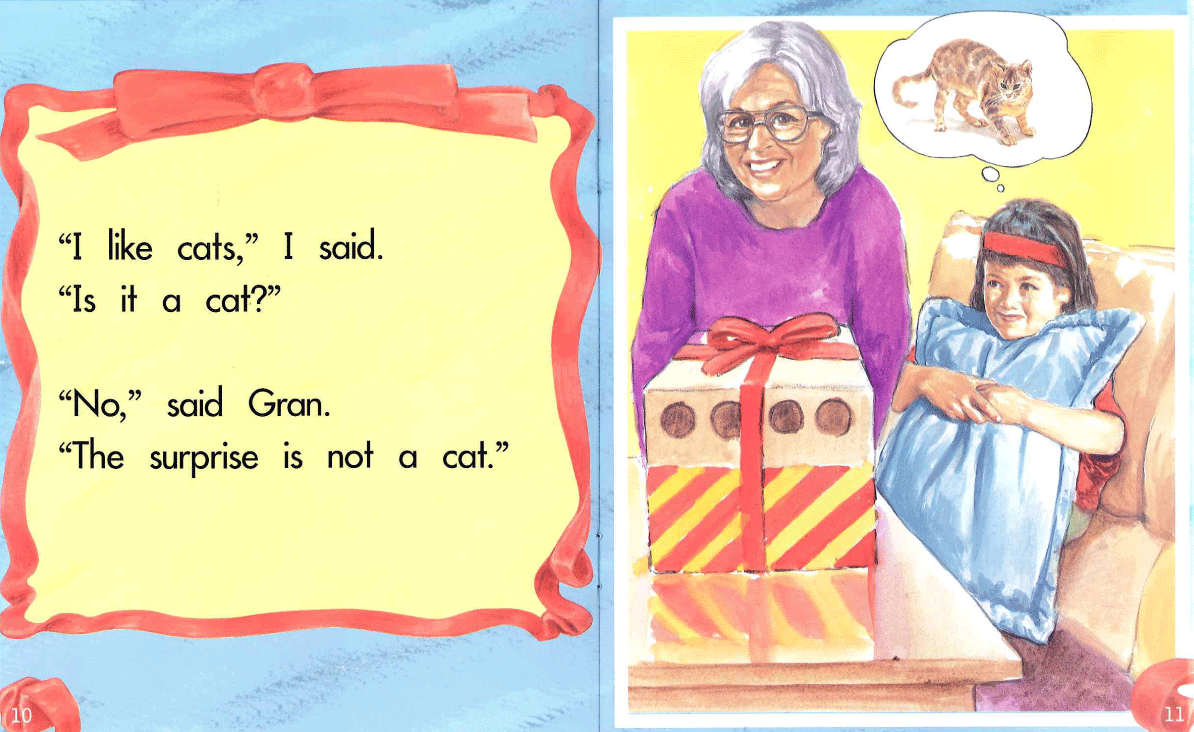
Information about the different types of animals that live in the city.
Word Count: 105
Text type: Information report
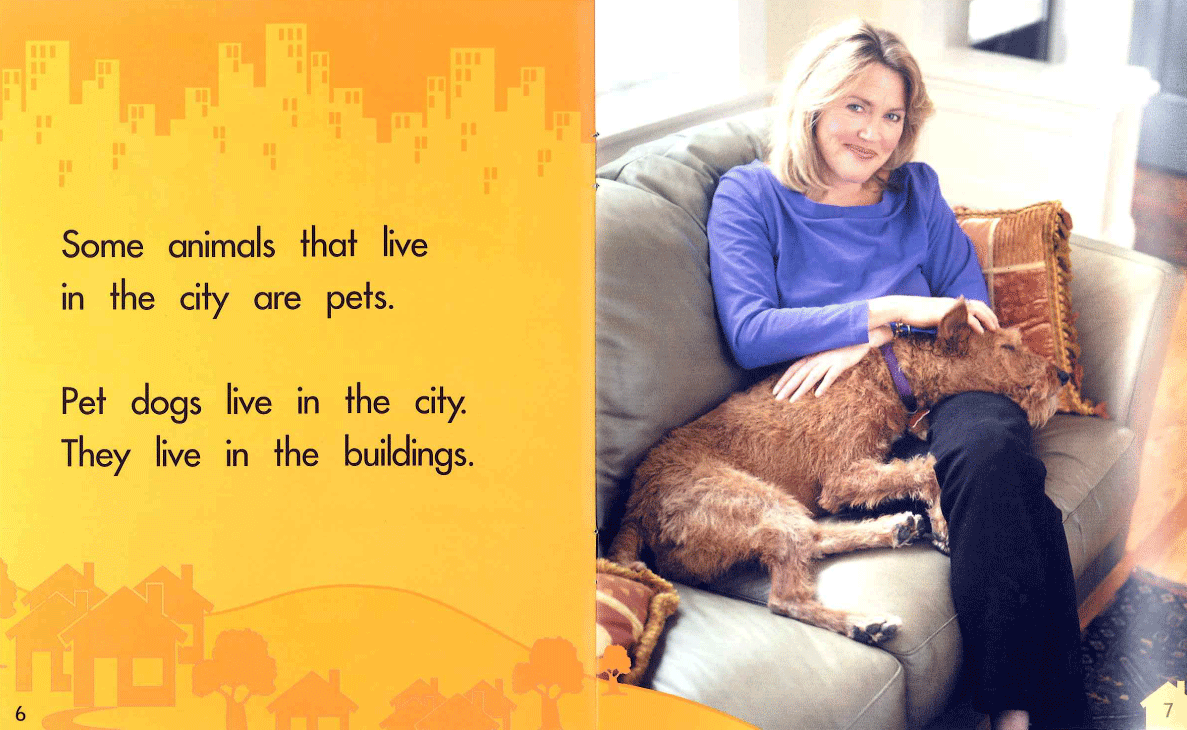
An entertaining story on some animals who are friends and escape from the zoo.
Word Count: 108
Text type: Narrative – fantasy
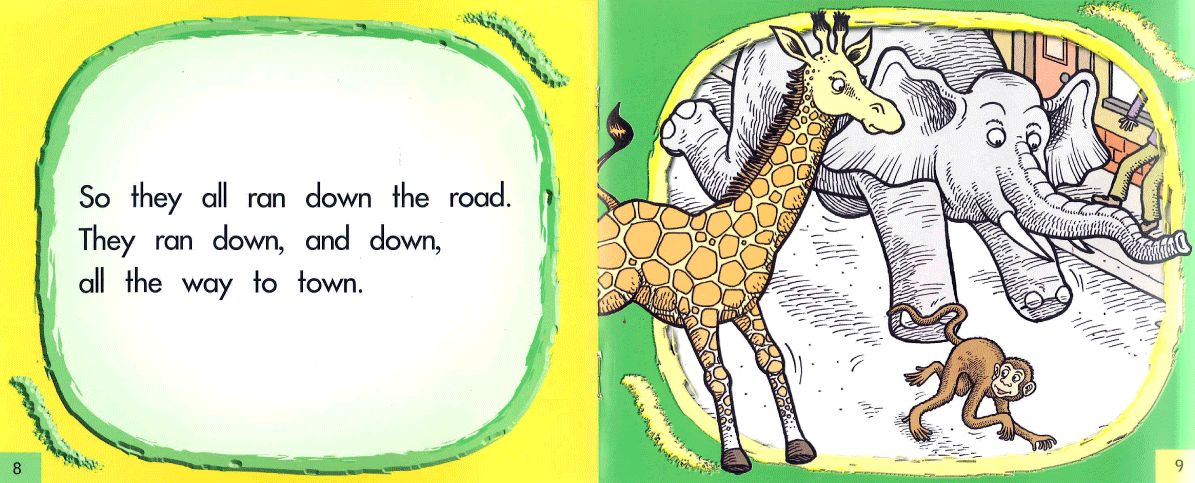
Two friends go to the moon to race their car.
Word Count: 107
Text type: Literary recount
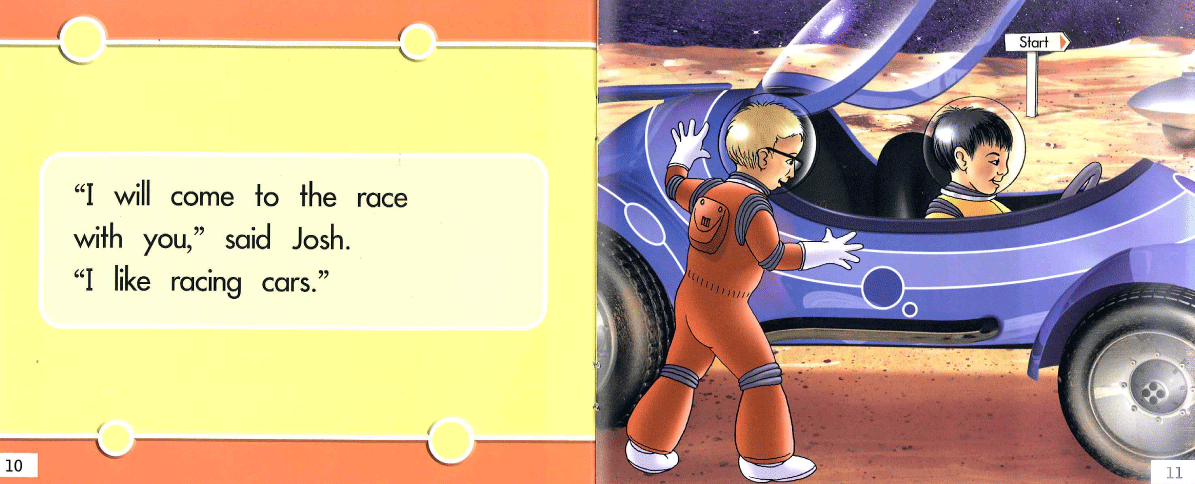
Describes the activities a little boy does when he comes home from school.
Word Count: 107
Text type: Factual recount
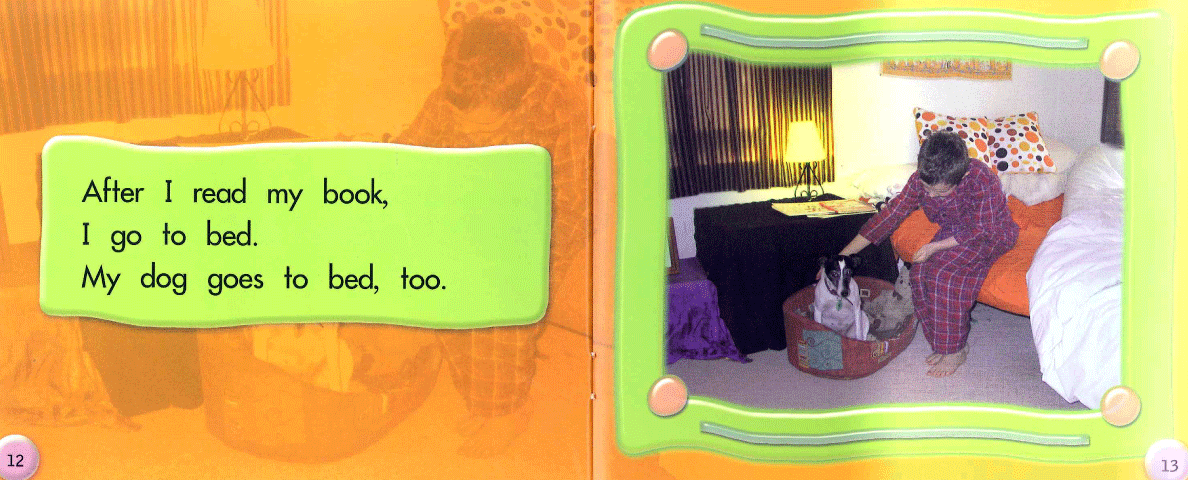
An entertaining story about a giraffe who wants to go skating but won’t wear a helmet.
Word Count: 101
Text type: Literary recount
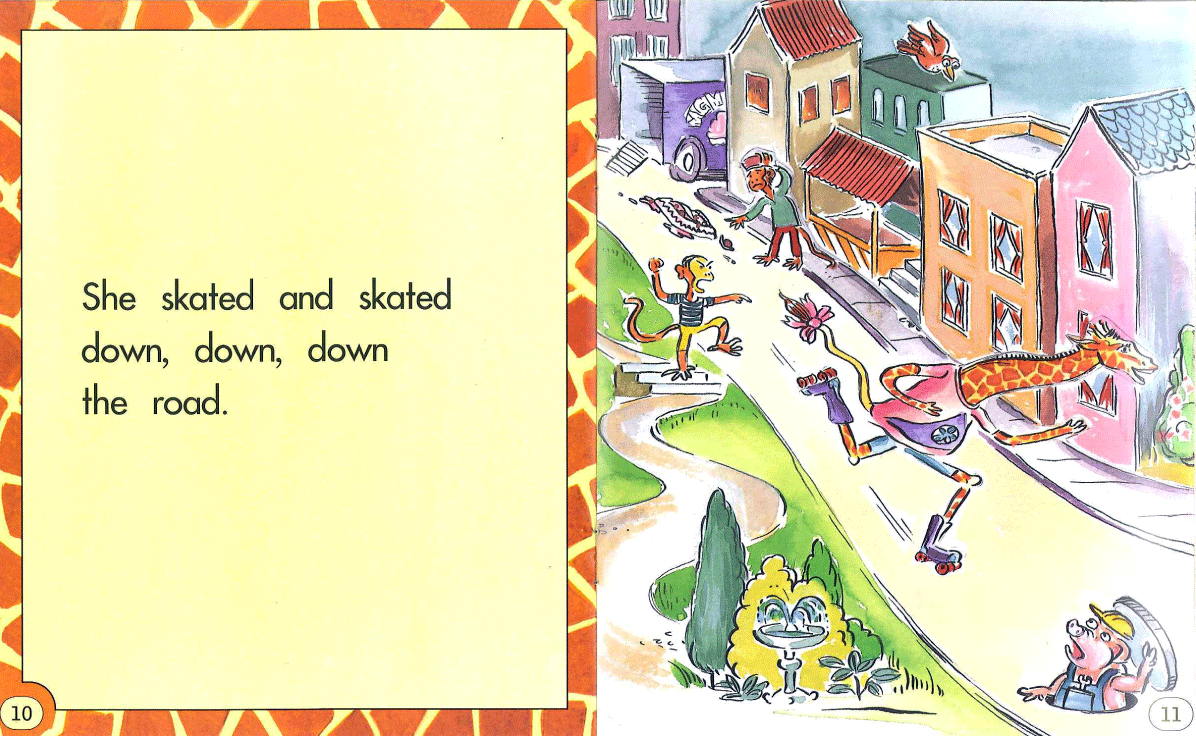
Step by step instructions on how to make a fruit salad.
Word Count: 102
Text type: Procedure
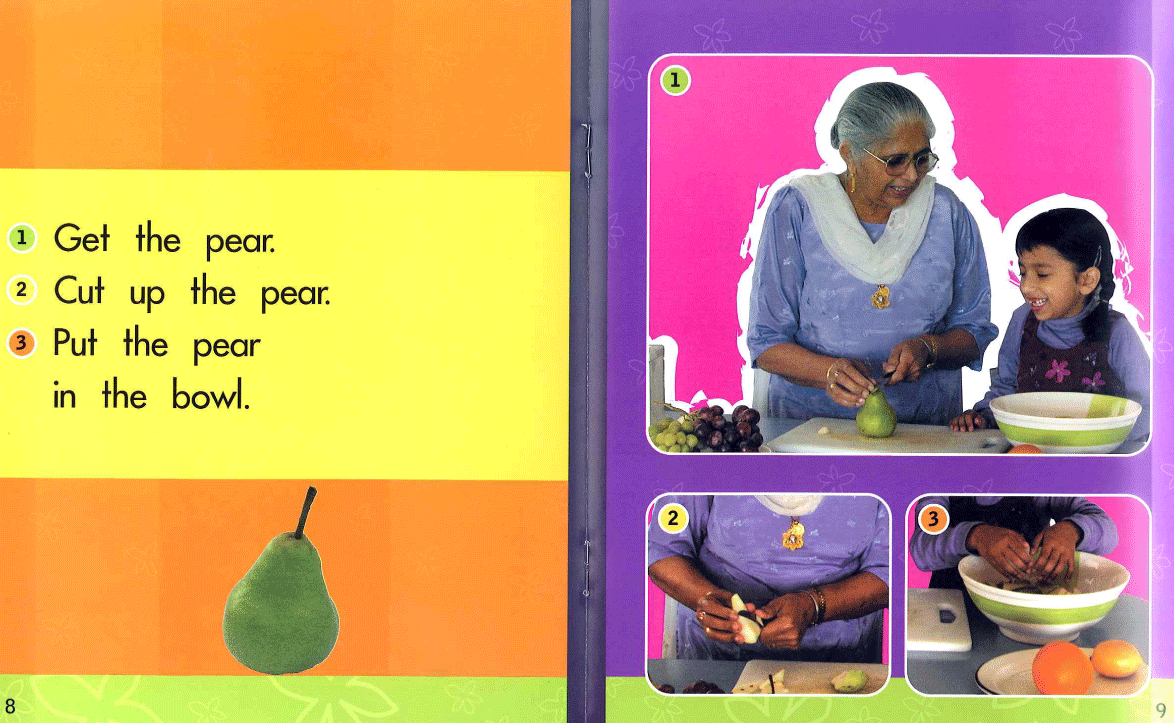
A lovely, simple story about a man who feeds the birds in the park when he goes to have lunch.
You can download free teaching guides for the books. They include reduced-size pages from each book along with detailed instructions for using each book with a class.
The teaching guides also contain 2 worksheets per book! After reading the book, have the students do the fun worksheets which check comprehension and give reading/writing practice.
It’s late March. A new school year is just around the corner.
As a teacher, I rarely give thought to my counterparts working away in the public junior high education system. We are “counterparts” in name only: “teachers”. But our work couldn’t be more different.
They teach English as a system to memorize for the purpose of passing tests, I teach English for the purpose of communication.
They teach English by and large in Japanese, I teach English in English.
My approach takes students’ self-esteem into deep consideration, their approach does not.
They give feedback to students’ efforts in the form of noughts and crosses on answer sheets, I give students the opportunity to self-correct problem areas, and all effort is good effort.
I take care to have my students feel success with English by having them actually use it, my junior high counterparts don’t.
And I’ll be frank; not only do I feel so very little in common with public junior English teachers, I often feel that much of their work goes against what I’m trying to achieve with my students.
Dwelling on our un-relationship is not productive for me so I don’t. However my students do on occasion bring our differences to my unwanted attention – especially when they discuss their tests and test scores. Consider the following end-of-term English “speaking test” as described to me by one of my 1st grade students…
In a one-on-one setting, a native-English teacher asked students a series of questions each of which were unrelated and to which there was no context. The questions were given in advance, and students were told previously they would be asked these very questions in the very same order. Students were required to memorize and produce the answers. Questions included “When is your birthday?” and “Which do you prefer, coffee or tea?”
During the test, if the student answered anything less than the memorized answer, it was considered incorrect. For example if the students answered “Tea” instead of “I prefer tea”, it was marked as incorrect. Similarly, if students answered “November 15th” or even “My birthday is November 15th” instead of “My birthday is on November 15th”, it was marked as incorrect. A total score out of 10 was calculated.
Now OK, I haven’t met or talked with the teachers who designed and conducted this test so I cannot know their thinking behind it. But I must say that I have some serious qualms about this test, particularly as it relates directly to students’ assessment of their speaking ability.
You would imagine that a “speaking test” would have some element of communication to it, but there was none here as the questions and their order were pre-given. The Monbukagakusho guideline of English education stipulates that its purpose is communication.
My student communicates in English well, but he spent valuable time before the test memorizing the petty detail to the answers his teacher wanted to hear. In the end, he lost a point because he forgot the word “on” in his birthday answer. (Incidentally, omitting “on” is NOT incorrect because “on” is only required when referring to something like a “meeting” or “appointment” which has a starting time and a finishing time: “My appointment is on November 15th.” Birthdays last the whole day so “on” is irrelevant. “My birthday is November 15th” is entirely acceptable.)
English tests like the one described here send a totally unhelpful message to our students. Instead of being a valuable and important tool for learning about others and sharing one’s ideas, English becomes a process of accurate recitation, of form over content, and the slightest technical error costs you marks. With English education like this, it’s no wonder that Japanese communication ability in English is low compared to nearly all countries where English is a foreign language.
It’s late March, and a new school year is just around the corner. So I call on my counterparts in the field of public education; instead of working against each other, let’s work more closely together. Let’s meet up with other English teachers in the community, join their teacher-development meetings and study groups. Let’s share perspectives on our students, their future and on the role of the English language within it. We are all teachers but currently we are doing disservice to our students and our profession. I believe that with cooperation we can work for our students more efficiently and effectively.
Hopefully too I may be able to have a conversation with my students about their school English education without cringing!

It was really, really good seeing so many teachers at the recent Learning World Workshops in Osaka, Nagoya and Tokyo.
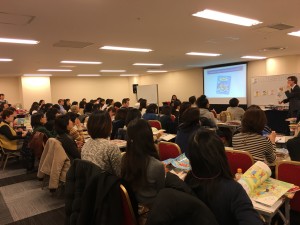 Osaka 2/28
Osaka 2/28
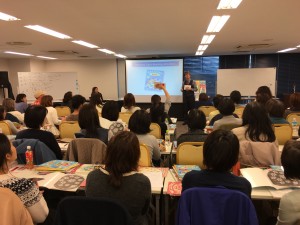 Nagoya 3/6
Nagoya 3/6
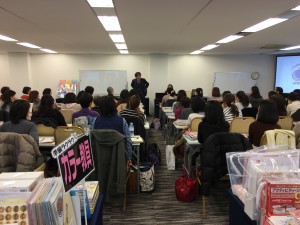 Tokyo 3/13
Tokyo 3/13
As a presenter, it’s exciting to see new faces. I always hope that new teachers can relate to the issues we bring to our Workshops, and can take home perhaps a new angle of looking at their teaching. If it was your first time to attend an APRICOT Workshop, I say thank you for coming, I hope you found it worthwhile, and I hope to see you again!
And as a presenter it’s of course also encouraging to see familiar faces. It tells me that teachers are indeed finding value at our Workshops, and are returning for more. If it was not your first time to attend an APRICOT Workshop, I say thank you for coming again, I hope you’re not tired of me presenting, and I definitely hope to see you again!
Thank you especially if your attendance at one of the Workshops involved a lot of travel. I understand that more than twenty teachers used the bullet train, and a few even arrived by plane! Your commitment of time and money to study reflects your commitment to your students. I think your students should give YOU a sticker!!
This year’s topic was a tough one – but a very important one, and one that has really been in want of discussion. The process of having our students attain the skill of reading can be frustrating for both teachers and students. However, if the teacher has a sound educational policy in place, if the students’ learning environment is stable, and if certain objectives are set and met with appropriate materials, students can find significant success with reading in a reasonable amount of time. My presentation at the Workshops attempted to show this.
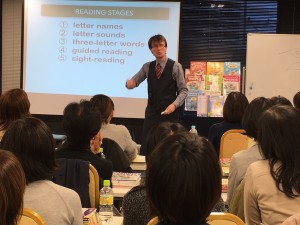
Thank you for your patience with the venue’s cramped conditions.
Thank you for your patience with occasional technical difficulties.
Thank you for your patience with my battle to stay properly time-managed!
Thank you for your written feedback. It means a lot to me, and APRICOT too of course. It lets us know that if we are making a positive difference for you and your students or not. Essentially, that’s what we want the Workshops to do. That’s what the Workshops need to do. Please know that the Learning World Workshops are YOUR workshops. Not one single Workshop will always satisfy everybody’s needs, as everybody’s teaching situations can differ widely. But your input in the form of inquiries to APRICOT is useful and welcome! Your inquiries help APRICOT understand where your concerns are, and these form the basis for Workshops.
If you weren’t able to join this year’s Learning World Workshops, please join us next year! Whether I’m presenting again or not next year, I hope to see everybody there!!
Thank you again!
